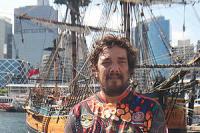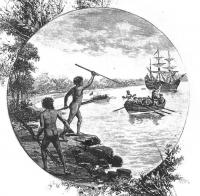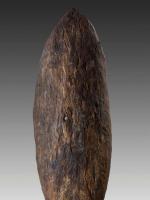April 28 1770. The first musket round ever fired over Australian soil rings out across what would come to be known as Botany Bay near Sydney, announcing the arrival of the British empire and disrupting more than 60,000 years of continuous occupation and successful governance. That first shot put a hole in a wooden shield held by one of the first Indigenous Australians ever sighted by the British. His name was Cooman and with a spear and shield he challenged the landing of two boats carrying 40 British marines.
He was shot in the leg and fled with a fellow Gweagal warrior, dropping his shield and spear. The shield still has a bullet hole. It resides in the British Museum. The spears are held by a museum of Cambridge University.
Known as the Gweagal Shield, it has become the centrepiece in a campaign to decolonise Australia’s history and set a course for justice for its dispossessed original inhabitants.
The significance of the Gweagal Shield is that, in a single artefact, it provides concise, poetic and irrefutable proof that from the very moment of first contact, Australia was not peacefully settled as in the myth told to the world.
Despite the violent history of the British empire up until then (and beyond), on this occasion it was not supposed to be that way. There were express written orders from the Admiralty and the King to make peace with the natives in Australia. Those orders were disobeyed.
April 28 1770 was the day that changed Australia forever…
Three Aboriginal men are on a six-week journey to Britain, the Netherlands and Germany giving an Aboriginal perspective on Australia’s colonial history, and trying to get back the shield and dropped spears Captain James Cook took to London. Cook rammed a flag on a stick into the ground and took “possession” of all Australia for the British crown.
One of them, Rodney Kelly, is the sixth time great grandson of the warrior Cooman and custodian of this story of first contact, passed down through the Gweagal clan for the past 246 years.
He will explain why he is travelling to the UK to retrieve the artefacts of his ancestors from the British Museum and from Cambridge University to the Gweagal clan from the Dharawal tribe in Sydney to form the centrepiece of an Aboriginal Living Cultural Heritage Museum.
Touring and presenting with him are Vincent Forrester, Luritja and Aranda elder from Uluru, and Roxley Foley, a Gumbaynggirr man from Nambucca Heads and custodian of the Sacred Fire at Canberra's Aboriginal Tent Embassy.
Forrester will tell stories from the dreamtime and speak about Australia before 1770, while Foley will talk about the issues affecting modern Indigenous Australia such as reconciliation, assimilation, constitutional recognition and deaths in custody.
The stories will be underlined with pictures and video material as well as sounds of the didgeridoo.
The presentation comprises three parts. It starts with dreamtime stories from before the British “discovery” in 1770 and from central Australia (Forrester), then the landing of Captain James Cook as passed down to Kelly by his ancestors and ends with Foley’s take on current Aboriginal misery stemming from the colonisation.
On 23 August 2016 the parliament of the state of New South Wales, where the invasion began in 1778 at what is now Sydney, accepted an application for the return of the Gweagal artefacts. The parliament passed a motion acknowledging that the shield and spears are rightfully owned by the Gweagal people and should be returned, and supported Mr Kelly in his efforts to have the artefacts returned.
David Shoebridge, MLC, who put the motion, said the artefacts represented the moment when Aboriginal people lost their isolation from European colonial expansion. "You can't not be moved by the symbolism of it," he said. "They tell of this extraordinary moment when these two brave men from the Gweagal clan stood up and faced off boat-loads of marines at the first moments of conflict and that first moment of Aboriginal resistance.
"It was extreme bravery. This tall ship with sails ... long-boats full of marines in their bright red uniforms and their muskets, coming ashore. They would never have seen anything like it before. But they had the extraordinary bravery of actually standing there and defending their land and resisting that first landing."
The federal parliament joined the demand on 11 October and pledged diplomatic support to Kelly for his repatriation effort.
It’s the first step to return. The second were talks scheduled for October with the British Museum and the Cambridge Museum of Archaeology and Anthropology. It’s no easy task because looted art is still a very touchy issue.
Many ethnological institutions have only recently begun critically to reflect on their own histories and roles in respect to indigenous peoples and their cultures. Typical of that are the first responses of the British Museums, which offered to possibly lend the items for exhibition in Australia.
But he’s not fighting for items on loan, says Kelly, adding: “The shield belongs into a museum in Sydney – that’s the only right place because ultimately the Gweagal elders will decide what happens with the shield and how the story connected with it is presented to our people and other Australians.”
The men are requesting donations to pay for their flights, accommodation, other travelling expenses, promotion and legal costs.
Berlin:
8 November – visit to the Ethnological Museum in Berlin where the curator for Australia will show artefacts from New South Wales and Central Australia to Rodney, Vincent and Roxley.
Leipzig:
9 November – visit to the Grassi GRASSI Museum für Völkerkunde zu Leipzig, where the curator for Australia will show artefacts of Australia to Rodney, Vincent and Roxley. After that they will do a lecture in the museum. 5 p.m.
Berlin:
First Contact 1770: The Story of the Gweagal Shield - audiovisual stage show
Thursday 10.11.2016 8 p.m. (opens 7 p.m.) Club
Admission: 6€ / concession 4€
Host: TU Berlin Institut f. Kulturwissenschaft und Historische Urbanistik
Berlin: 12 November – workshop with students of the Technical University of Berlin about stolen artefacts
Amsterdam November 18-19
London: Saturday Dec 2-3
Facebook: facebook.com/gweagalartefacts
Contact Gweagal Tour: Marion Caris, mcaris@marioncaris.com
Some links:
http://www.mvl-grassimuseum.de/veranstaltungen/cal/event//tx_cal_phpical...
http://www.werkstatt-der-kulturen.de/de/spielplan/?datum=2016-11-01&mode...



